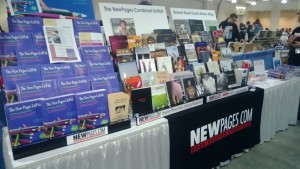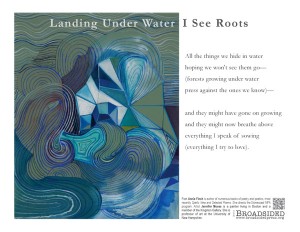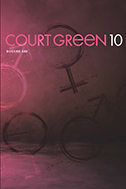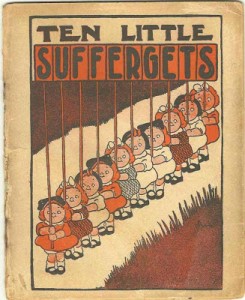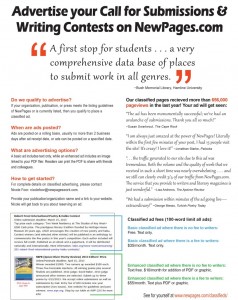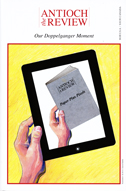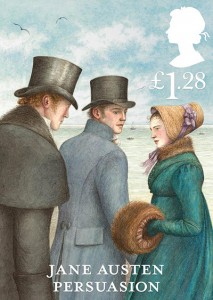Enter Shadowbox’s site and you’ll see a shadowbox filled will several objects. Clicking on the image of the flowers will bring up this issue’s featured writing. It brings up a spice rack, each bottle containing a spice of life, if you will. Dedicated entirely to all forms of creative nonfiction, Shadowbox presents a collection worth reading. Some pieces are in the traditional essay form, while others stray quite a bit, opening up new ways to see creative nonfiction. Continue reading “Shadowbox – Spring 2013”
NewPages Blog
At the NewPages Blog readers and writers can catch up with their favorite literary and alternative magazines, independent and university presses, creative writing programs, and writing and literary events. Find new books, new issue announcements, contest winners, and so much more!
Shadowbox – Spring 2013
Spread the word!
Temenos – Winter 2013
Temenos, the journal of Central Michigan University, is a Greek word that “refers both to the ancient Greek concept of sacred space and the Jungian ‘safe spot’ where one may bring the unconscious into the light of consciousness.” The editors say that their mission is to “bring to light works that are engaging, memorable, and fearless.” Continue reading “Temenos – Winter 2013”
Spread the word!
Women and Review Publications
The VIDA Count for 2012 has been posted.
Spread the word!
We’re Back!
Some of us from NewPages spent last week at the Association of Writers and Writing Programs (AWP) Conference in Boston, MA. It was fantastic, and we want to say a huge thanks to everyone who stopped by our bookfair tables to say hello. We spend 99.9% of our work time here at the computer, so being able to meet people face-to-face is a great opportunity for us. We appreciated hearing your comments about the site – what you like and how we can make it better. Ten years ago, when NewPages attended our first AWP, we spent hours walking the bookfair floor, introducing ourselves, explaining our site, our concept, our vision. Now, people recognize our name and shout out: “I love NewPages!” and “You guys do great work!” Thanks to all of you who shouted, stopped, said hello, and chatted it up with us. We do love meeting you and hearing from you. Please excuse our absence from the blog while we caught our breath, but get ready, because we’ve got tons of great stuff to share from AWP and will be spilling that out over the next few weeks.
[That blue book you see on our table is The NewPages Lit Pak for AWP Boston 2013 and is available for free on our site here.]
Spread the word!
Snowflakes Fall: Tribute to Sandy Hook
Newbery Medalist Patricia MacLachlan and acclaimed picture book creator Steven Kellogg will collaborate to create the children’s book Snowflakes Fall as a tribute to the community of Sandy Hook, Connecticut. The book is slated for release this November from Random House and can be pre-ordered directly from their website. The publisher notes: “Random House Children’s Books together with Random House, Inc. will make a significant monetary donation to child-focused organizations that will be chosen by the collaborators.”
Spread the word!
Matthew Quick Keynote Speech
“When you say you want to write a novel when you’re 17, people think it’s cute,” Mr. Quick said. “When you’re 32 years old and you’re living with your in-laws, especially if you are a man in America and you’re not making any money, people make you feel like you’re committing a crime.” Matthew Quick, author of The Silver Linings Playbook, from his keynote speech at the 23rd Annual Betty Curtis Worcester County Young Writers’ Conference on Saturday at St. John’s High School. Read the rest on Telegram.com.
Spread the word!
The Weekly Reader Welcomes New Hosts
Started in 2010, the KMSU Weekly Reader is an author interview radio program currently hosted by newcomers Kyle Jaeger, Alec Cizak, and Beth Mouw. It airs on KMSU 89.7 FM in Mankato Minnesota, and is available as a podcast through iTunes. The Weekly Reader airs in-depth discussions with authors from all around the country. Authors, publishers, and agents are welcome to contact the hosts and send books to the hosts.
A sample of archived archived programs:
Adams, S. J., Sparks
Bugan, Carmen, Burying the Typewriter
Cohen, Joshua, Four New Messages
D’Souza, Tony, Mule
Fell, Adam, I Am Not A Pioneer
Gabbert, Elisa, The French Exit
Hagy, Alyson, Boleto
Karrow, David and Joseph Butts, The Alpha League
LeBoutillier, Nate, Horse Camp
Memmer, Philip, The Storehouses of the Snow
Nau, Dennis, The Year God Forgot Us
Pinda, Jon, Sleep In Me
Ryan, Matt, Read This Or You’re Dead To Me
Sanders, Ted, No Animals We Could Name
Terrill, Richard, Music and poetry, China twenty years later
Vizenor, Gerald, Chair of Tears
Wells, Will, Unsettled Accounts
Spread the word!
To Copyright or Not To Copyright
If you’re not already reading Writer Beware! (“the public face of the Science Fiction and Fantasy Writers of America’s Committee on Writing Scams”) on a regular basis, then now the time to start. A recent post by regular blogger and published writer Victoria Strauss examines why and when writers should copyright their work. The post calls out the practice of vanity publishers trolling copyright registration lists for fresh meat new customers.
Spread the word!
Poster Your Own Broadsided
Edited by Elizabeth Bradfield, Gabrielle Calvocoressi, Sean Hill, Alexandra Teague, and Mark Temelko, Broadsided has been putting literature in the streets since 2005. Each month, a new broadside is posted both on the website and around the nation.
Writing is chosen through submissions sent to Broadsided. Artists allied with Broadsided are emailed the selected writing. They then “dibs” on what resonates for them and respond visually – sometimes more than one artist will respond offering a selection of broadsides.
The resulting letter-sized pdf is designed to be downloaded and printed by anyone with a computer and printer. The goal is to create something both gorgeous and cheap, to put words and art on the streets.
The site contains a gallery of past broadsides, a map of cities/state/countries that have been broadsided (and where you can add yours), and links to other broadside sites.
Staple guns and duct tape to the ready – time to get your city on the map!
[Pictured: Broadsided March 1, 2013: “Landing Under Water I See Roots” Poem by Annie Finch; Art by Jennifer Moses]
Spread the word!
Craft Essays: Glimmertrain Bulletin :: March 2013
The March issue of Glimmer Train’s eBulletin features craft essays by writers whose works have recently appeared in Glimmer Train Stories:
In “Literary Fabric,” Vi Khi Nao begins, “Writing should be a cinematic moment. The function of a writer is to convert word in such a fashion that its etymological beauty moves from frame to frame. In this state, anything is possible. Including the possibility of levitating, descending, dancing—a cinematic place filled with balletic gestures of human pain, sorrow, and bliss.”
William Luvaas in “ON REVISION / REVISION” writes: “Revision can be tedious. Can seem like pathological nit-picking. It can feel like we are endlessly redigesting our own words. But, incredibly, rather than making a story seem labored and lifeless—as intuition suggests it would—revision liberates it and makes it appear effortless.”
“Being Open to Opportunities” for Matthew Salesses is two-sided, “Whenever I am asked to do anything, in the literary world, I agree if at all possible. I hate to turn down anyone genuinely interested in me or my work. How rare and amazing that attention is. This kind of philosophy can backfire, of course.”
Joyce Thomson learned, as she expresses in “The Fan Letter”: “I had wanted to be able to make readers laugh, cry, and think. Now I amended my wish list: I want to make people identify beyond the furthest outposts of their prejudices.”
The bulletin is a free, monthly publication.
Spread the word!
Court Green Gets Steamy
Court Green, published in association with Columbia College Chicago, publishes a new dossier of poems each year. This year, the theme is sex.
Poems include titles such as “Where the Mood Struck Me” (Jeffery Conway), “Quiet, I come Alive” (Phillip B. Williams), “The Fury of Cocks” (Anne Sexton), “Blowjobs” (Sarah Crossland), “How Did Dinosaurs Have Sex?” (Lois Marie Harrod), “A Psalm Praising the Hair of a Man’s Body” (Denise Levertov), “Fertility” (Christopher Davis), and many more.
Other poets in this issue include Jan Beatty, Anselm Berrigan, Denise Duhamel, Kimiko Hahn, George Kalamaras, Ron Koertge, R. Zamora Linmark, Gillian McCain, Karyna McGlynn, Randall Mann, Gordon Massman, Richard Meier, Harryette Mullen, Kathleen Ossip, Mary Ruefle, Jerome Sala, Jason Schneiderman, Maureen Seaton, Terence Winch, and many more.
Spread the word!
Call for Undergrad/Grad Comparative Lit Papers
The Department of Comparative Literature at the University of Georgia is launching a new journal of comparative literature, Xenophile. This journal will feature the works of undergraduate and graduate students from around the world. They are currently seeking submissions for the premiere issue. This is a perfect opportunity for undergraduate students seeking their first (or second, or third) scholarly publication, as well as for graduate students hoping to reach a new audience.
Papers will be evaluated on a rolling basis, but the final deadline is March 15th, 2013. The editors seek literary scholarship with a global scope, keeping in mind the comparative aspect that distinguishes the literary discipline from others. For more information, please refer to the publication website.
Spread the word!
Literary Audio for Your Road Trip
Be sure to check out the NewPages Literary Multimedia Guide – podcasts, videos, and audio programs of interest from literary magazines, book publishers, alternative magazines, universities and bloggers. Includes poetry readings, lectures, author interviews, academic forums and news casts. Great for downloading and listening during the upcoming winter months – while traveling, walking, shoveling the sidewalks – you name it. If you have a site you’d like us to consider for listing, send a link with a description and contact information to denisehill at newpages dot com. Good reading starts here! (And listening, too!)
Spread the word!
The McGinnis Ritchie Award
Southwest Review announces the winners of The McGinnis Ritchie Award for 2012. Robert F. Ritchie was a huge supporter of the magazine. After he died in 1997, the magazine was able to give an award each year to the best works of fiction and nonfiction published in that year. Each award is worth $500.
J. F. Glubka
2012 McGinnis-Ritchie Award for Fiction
“Heat Lightning”
(Volume 97, number 4)
Jacob Newberry
2012 McGinnis-Ritchie Award for Fiction
“The Long Bright World”
(Volume 97, number 4)
Gorman Beauchamp
2012 McGinnis-Ritchie Award for Nonfiction, Essay
“‘But Tiepolo is My Painter’: Twain on Art in A Tramp Abroad”
(Volume 97, number 4)
Ann Peters
2012 McGinnis-Ritchie Award for Nonfiction, Essay
“The House on the Ledge”
(Volume 97, number 1)
Spread the word!
AWP Tips on Visiting Boston
A friend and colleague who is familiar with the Boston area shared the following with me when I asked her: “What should I do/see while I’m in Boston? If you could tell me one really great/cool/fantastic/don’t-miss-this ‘thing’ about Boston what would it be? And then, add all the runner-ups to that one best thing.” She couldn’t contain herself – obviously, she’s a fan of the area – so here’s what she sent me and agreed to allow me to share. So, thank you Lauren!
Sights/things to do very near the conference
1. The Prudential (the Pru) Building and Top of the Hub: Wonderful view of the city from the top of a landmark building. The food and drinks are way overpriced, but you could splurge on maybe one drink.
2. The Hancock Tower: Another cool building. It’s not as tourist-friendly as the Pru, but people enjoy the view.
3. Trinity Church: Beautiful old church and set for many movies.
4. The Trident Booksellers and Cafe: A MARVELOUS independent bookstore on Newbury Street (one street over from Boylston). A staple of progressivism, too.
5. If the weather is bearable, and you like looking at old architecture, you could spend a few hours walking around the Back Bay neighborhood. Boylston, Newbury, Commonwealth, Marlborough, and Beacon Streets are the major thoroughfares. Boylston is probably the least interesting, but it’s home to lots of lunch and coffee places (mostly chains from what I remember). Newbury Street is for art and fashion – this is where the rich and au courant live. You might find more adventurous lunch places along Newbury. Commonwealth, Marlborough, and Beacon are residential and lined with beautiful brownstones. Commonwealth is a wide street with little spots of green in it.
6. The Public Garden: You get to this historic, European-style garden from the end of Boylston or Newbury Street. Serene and dignified.
7. Across from the Garden is the Boston Common, a larger and less refined park. It is the oldest public park in America, though, and it offers the starting point for the Freedom Trail. If you like colonial history, it’s cool to walk the Freedom Trail. Sometimes, you end up on it accidentally – it’s marked with a big red line. I recommend a stroll through the Common if you want to see normal Bostonians in action.
8. The Isabella Stewart Gardner Museum: A quirky, gorgeous museum with a great restaurant. You can take a cab or the T (Get on at the Pru station and take an E train to the “Museum of Fine Arts” stop).
Food and drink near the conference
1. The Cactus Club: Decent Mexican food and margaritas.
2. Bukowski Tavern: One of my favorite bars of all time!!! Large selection of beers in a cozy environment. I suggest bringing a book, a tablet, your lovely spouse, etc., and settling in for a few hours. It will likely be packed the whole time we’re there – it’s a hipster mecca already, and with this hipster conference in town…still, worth it!
3. Legal Seafoods: A favorite with seafood fans. Very corporate but also very good. Inside the Pru.
Food and drink somewhat near the conference
1. Beer Works: For your microbrew needs! It might be easier to take the T there (Green Line to Kenmore or Yawkey), but it really wouldn’t be that far of a walk. It’s nothing special in terms of food and decor, but the beers are tasty. It’s next to the famous Fenway Park.
2. Addis Red Sea: Amazing Ethiopian food. Likely to be crowded, and worth the small cab fare it will take to get there.
3. The Green Dragon Tavern: Charming, friendly old bar dating back to the Revolutionary War. Take the Green Line to Government Center.
4. The Union Oyster House: I’ve never eaten there, but it’s a Boston institution. For chowder and lobster. Take the Green Line to Government Center.
5. Brown Sugar Café: Excellent Thai food! Somewhat T –accessible, but it’s probably easier to take a cab.
CAMBRIDGE INFO
If you have the time, I definitely suggest a side trip to Cambridge, an intensified, bigger version of Ann Arbor [a Michigander reference]. Harvard Square is easy to get to by T (the Red Line to “Harvard Square”), and it’ll offer you no shortage of cool places to visit.
You can get great, great beer at John Harvard’s. It’s a little stuffy for a brewery, but I like it better than Beer Works. I’m also fond of Shay’s – although their website makes it look more upscale than I remember.
For a more working-class, grubbier part of Cambridge, go to Central Square (Red Line to “Central Square”). You can get a feel for it walking up and down Massachusetts Avenue (the main street in Cambridge). Western Avenue and Prospect Street are also fun to explore. The best Indian and Middle Eastern food and markets are found here.
Go to either location of the 1369 Coffee House if you want to hear people planning the revolution.
My favorite Central Square Irish pubs:
The Field
The People’s Republik
The Cantab Lounge hosts a fantastic poetry slam on Wednesday nights. Lots of slam greats got their start there. And only in Cambridge does a poetry slam occasionally get SOLD OUT.
While I don’t especially love the MIT bar The Miracle of Science, it’s unique and extraordinarily popular.
Spread the word!
The Moon & Other Inventions
American artist Joseph Cornell (1903-1972) has long been a favorite among poets and writers. His work first appeared in art shows and galleries advertised as surrealist, frequently accompanied by and/or incorporating text. In his own lifetime, he directly courted the friendship and patronage of poets such as Marianne Moore and Elizabeth Bishop. In addition, poets ranging in diversity from John Ashbery to Charles Simic have also written about the attraction his work holds for them and/or composed poems in his honor. Cornell also completed a number of various homages to poet Emily Dickinson. In short, there’s poems-a-plenty in existence that interact one way or another with Cornell and his work. By joining in such company, Kristina Marie Darling is taking the risk that her work be held to a similarly high standard. Or rather, in composing a book so directly addressing Cornell’s work, the assumption is that Darling herself is aware she’s aiming high and must be willing to hold her own work to these standards. Continue reading “The Moon & Other Inventions”
Spread the word!
Bibliodeath
If you are reading this review, chances are good that books, those things with lots of words crammed between two covers, are probably an integral part of your life. You live with them, thumb through their pages, pass them on to friends, and—if you have enough—make furniture with them (as do I). If this describes you in any way, you will doubtless do yourself a favor by reading Andrei Codrescu’s take on the printed word both past and present, how it lives, where it goes, and the very nature of archives. Bibliodeath is also a portrait of a life lived with books and words. At the end of his tome, Codrescu states: “It is still possible, for as long it took you to read this book, to distinguish the quickly vanishing border between the real and the virtual. This essay is a history of how I got to that border, and how I moved to one or another side of it.” Indeed, Codrescu surveys with depth and humor this very transition we are living through, the digitization of our words. Continue reading “Bibliodeath”
Spread the word!
The Way of the Dog
Sam Savage’s narrator Harold Nivenson is, in Harold’s own words, a minor artist. Yet The Way of the Dog, though a slim novel, is anything but a minor work. Continue reading “The Way of the Dog”
Spread the word!
Y
I’ve been thinking a lot about masculinity lately, more specifically the particularly violent attitudes that have been swirled into recent discussions about mental illness, gun laws, sexual violence, and football. In this miasma, masculinity is presented as problem, as a relation of actions based on constructed ideals. But of course, a person is not a problem, or not only a problem, and especially not to his mother. Continue reading “Y”
Spread the word!
The Lighthouse Road
With its depiction of wintry weather along the shores of Lake Superior and even a view of Isle Royale, Michiganders (and Wisconsinites) will relate to Peter Geye’s novel The Lighthouse Road even though its setting is Northern Minnesota. Geye is a native of Duluth, and some of the novel’s action takes place there, but mostly it alternates between 1895-96 and 1910-37 in the lakeside town of Gunflint, near a logging camp called Burnt Wood Camp. Continue reading “The Lighthouse Road”
Spread the word!
The Memoirs of JonBenet by Kathy Acker
This book of thirteen short essay-stories, The Memoirs of JonBenet by Kathy Acker by Michael du Plessis, is dense with conflated cultural images that construct an alternate unreal-real reality of consumer America. The story’s location is Boulder, Colorado, in a a snowglobe, the kind bought at a “cheap airport gift store and stuck at the foot of the Rocky Mountains.” Boulder is also the place where JonBenet, a six-year-old beauty pageant queen and possibly one of the narrators, was murdered on Christmas Eve in 1996. The other possible narrator of this “fiction inside a fiction” is the dead writer Kathy Acker. Then, there is another narrator, as JonBenet and Kathy Acker discuss: “Somewhere a narrator still worries, almost like a grown-up.” These narrators “out” each other and often call attention to the narrative as a narrative. Continue reading “The Memoirs of JonBenet by Kathy Acker”
Spread the word!
Purple Daze
Hey Mr. Tambourine Man, pick up a copy of Sherry Shahan’s book Purple Daze and smell the incense and peppermints. Equally appealing to readers who lived through the 1960s and to those who didn’t but want to know what it was really like, Shahan has created a compelling chronicle of a single tumultuous year: 1965. This particular window to the past is unusual for a couple of reasons. First, Purple Daze features not one main character, but six. Ziggy, Mickey, Cheryl, Nancy, Don and Phil are a group of friends growing up in Los Angeles. The second thing that sets this book apart is the fact that Shahan has chosen to write much of the novel in verse. Our protagonists share their stories through poems, notes, letters, journal entries, and song lyrics. While this format might seem an odd choice from the outside, Shahan’s skill and range engenders a level of intimacy with each character that is surprising given the brief snatches of information shared in a given moment. The reader feels the drama as the paths of these six friends diverge and darken with the weight of the year’s events. Ziggy writes: Continue reading “Purple Daze”
Spread the word!
The Glimmering Room
Have you listened to those early songs by Cat Power where the speaker lists the names of friends from her youth who grew up abused, turning to sex and drugs way too early in life? These poems by Cynthia Cruz are just like those songs. I’ve discovered that Chan Marshall (aka Cat Power) never quite had friends with those exact experiences or went through all that miserable hell herself. It doesn’t bother me too much either. The songs are still damn good. Powerful, moving, and quite evocative, the poems of Cynthia Cruz equally match all the grime and dark foreboding of Cat Power’s best licks. The Glimmering Room hits the same raw nerve, again and again: Continue reading “The Glimmering Room”
Spread the word!
AWP To Do and See Advice
Ploughshares shares their “to do” list for those attending AWP Boston 2013:
Spread the word!
Ten Little Suffergets
Published c. 1910-1915: “As in Ten Little Indians, the group loses a member in each sequence, here for typical transgressions of little girls: gobbling cakes, crying over a dead doll, kissing a boy, – the usual sins of the contemporary sub-Sweet Sixteen set, suffragettes as self-destructive children…” Read the rest of Stephen J. Gertz’s commentary considering possible authorship of the booklet in the context of opposition to the woman’s vote and see all ten images (plus cover) on Booktryst. The booklet is actually for sale via The Literary Lion.
Spread the word!
Looking for New Reviewers
We are looking to add on a few more regular book and/or magazine reviewers for NewPages. If you are interested, please stop by the NewPages table at AWP (J1 & J2) and talk to Kirsten. If you are interested but will not be at AWP, feel free to send an email to Kirsten at kirstenmcilvenna@newpageswork.com for magazine reviews and to Holly at hollyzemsta@newpageswork.com for book reviews.Check out this info before emailing.
Spread the word!
Get Your Ad Seen
Advertising calls for submissions and writing contests on NewPages.com has proven to be very successful for many magazines and presses:
“. . . the traffic generated to our site due to this ad was tremendous. Both the volume and the quality of work that we received in such a short time was nearly overwhelming. . . . and we still can clearly credit 3/4 of our traffic from NewPages.com. The service that you provide to writers and literary magazines is just wonderful,” says Lisa Andrews from The Apeiron Review, a relatively new literary magazine.
You can learn more about running ads with NewPages here. And if you’re at AWP, feel free to stop by the tables J1 & J2 so we can answer any of your questions!
Spread the word!
Pongo Writing Resources for Teachers & Teens
The Pongo Teen Writing Project mentors personal poetry by teens who’ve suffered childhood traumas, such as abuse and neglect. The writers work with youth inside jails, shelters, psychiatric hospitals, and other sites. They help youth worldwide through the interactive writing activities on our web site. Their primary purpose is to help our authors understand their feelings, build self-esteem, and take better control of their lives.
Pongo’s latest blog, “Being Pretty on the Inside,” shares some great teen poems – the latest winners of the Pongo Poetry Prize – on themes of struggling to be ourselves and also please others as well as the vulnerability we feel in doing so.
In “If My Fist Could Speak” (January 2013) a young woman, age 13, speaks intensely and courageously to a bully. She writes: “You should eat diamonds so you can be pretty on the inside.”
In “If God Were Looking at My Life” (October 2012), a young woman, age 14, writes: “If God opened a new door for me…I’d change who I was, and I would try to find the real me. The me who isn’t afraid.
Pongo has expanded its effort to help distressed youth through poetry, not only with their ongoing projects inside juvenile detention and the state psychiatric hospital, but by mentoring “duckling” projects on the Pongo model. Pongo is currently consulting with five start-ups, including projects in Seattle, Sacramento, and Ann Arbor. These programs are helping homeless youth, youth in psychiatric care, youth in detention, and youth in foster care.
Spread the word!
The New Classics: Emoji Dick
Funded through Kickstarter in 2009, Fred Beneson’s Emoji Dick is now available for purchase. It is copyrighted through Creative Commons with some permissions built in and was recently accepted into the Library of Congress. The Kickstarter video explains the project – taking sentences from Moby Dick and translating them into Emoji – Japanese comic icons. [Sample shown.] Each of the 10,000 sentences in the book was translated three times, then the three versions were voted on for inclusion. “In total, over eight hundred people spent approximately 3,795,980 seconds working to create this book.” Print copies of Emoji Dick are available for purchase $40 for B&W softcover and $200 for full color hardcover.
Spread the word!
Chapbooks Issue
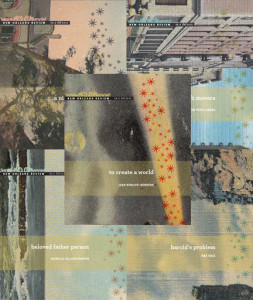 The New Orleans Review‘s Fall 2012 issue is actually a set of five chapbooks. All under a similar design, the chapbooks include Juan Rengifo-Borrero’s “To Create a World,” Patricia Colleen Murphy’s “Beloved Father Person,” Max Ross’s “Harold’s Problem,” Lynda Sexson’s “A Nickel Novel,” and Cody Peace Adams’s “Polish Movers.”
The New Orleans Review‘s Fall 2012 issue is actually a set of five chapbooks. All under a similar design, the chapbooks include Juan Rengifo-Borrero’s “To Create a World,” Patricia Colleen Murphy’s “Beloved Father Person,” Max Ross’s “Harold’s Problem,” Lynda Sexson’s “A Nickel Novel,” and Cody Peace Adams’s “Polish Movers.”
Spread the word!
2012 Non-Fiction Contest
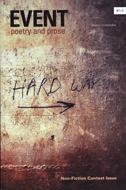 Event‘s Winter 2013 issue features the two winners of the magazine’s 2012 Non-Fiction Contest. There were 101 entries, ten of which were selected by Event’s staff and sent (without the writer’s names attached) to Zsuzsi Gartner, the contest judge.
Event‘s Winter 2013 issue features the two winners of the magazine’s 2012 Non-Fiction Contest. There were 101 entries, ten of which were selected by Event’s staff and sent (without the writer’s names attached) to Zsuzsi Gartner, the contest judge.
Winners:
Mary B. Valencia: “The Decision”
Libby Zeleke: “We Were Punk Rockers”
Gartner writes that she wasn’t surprised that all ten pieces she read were memoirs: “Although it was disappointing not to discover narrative non-fiction tha was more outward looking, it did make my job easier. Apples to apples it would be—and some crisp Ambrosias, tangy Empires, sweet Galas, and pie-worthy Granny Smiths were found in the mix. So I come not to bury the memoir, but to praise it!”
8 short-listed entries:
Paige Cooper: “The Dead in Georgetown”
Trisha Cull: “The Doctor Scott Journals
Chris Donahue: “Where Poison Gets Ya”
Katherine Fawcett: “Promo Girl”
Kirsten Madsen: “Kestrel”
Sigal Samuel: “Sadder Than You”
Emily Walker: “The Grey Goose and Wild Turkey Years”
Terence Young: “Liquor Run”
Spread the word!
Ready for AWP?
Can you believe that in just one week, we’ll be packing or already en route for Boston? Although it certainly hasn’t crept up on me, I still can’t seem to believe that it’s happening so soon. At NewPages, we’ve been hard at work, preparing everything we need to take with us. And this year, we are bringing out LitPaks again; but this year, they are even better!
The bound LitPak includes a listing of all the tables and booths that will be at the bookfair as well as lots of information from presses, creative writing programs, and literary magazines. Make sure to stop by our table (J1 & J2) to get your copy (and of course say hello to us!).
But knowing that you can’t possibly wait until then, we are offering a free PDF that you can either view online or download to your desktop. This way, you can plan out your bookfair sleuthing before you’ve even packed your bags.
Here is a link to where you can get the PDF. Even if you aren’t attending AWP, there is a lot of good information in there for writers, so be sure to share the link with any friends, colleagues, and students!
Spread the word!
Women Write Serious Nonfiction
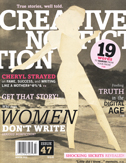 The cover of the latest Creative Nonfiction issue reads, “Who says Women Don’t Write Serious Nonfiction?” And this issue proves that women do. Lee Gutkind writes in his editor’s note that they didn’t intend to publish and all-women essay section: “CNF consistently receives more submissions from women than from men. As we read for this issue, we were drawn to a number of essays about, in some way, ‘the senses’—hearing, sight. Or maybe it’s more accurate to say they’re about ‘perception.’ It just so happened that all of them were by women.” And in correspondence with the cover, Gutkind says, “I think there are a lot of women writing serious nonfiction; they’re just not getting the serious attention they deserve.”
The cover of the latest Creative Nonfiction issue reads, “Who says Women Don’t Write Serious Nonfiction?” And this issue proves that women do. Lee Gutkind writes in his editor’s note that they didn’t intend to publish and all-women essay section: “CNF consistently receives more submissions from women than from men. As we read for this issue, we were drawn to a number of essays about, in some way, ‘the senses’—hearing, sight. Or maybe it’s more accurate to say they’re about ‘perception.’ It just so happened that all of them were by women.” And in correspondence with the cover, Gutkind says, “I think there are a lot of women writing serious nonfiction; they’re just not getting the serious attention they deserve.”
The first feature of the issue is a conversation between Cheryl Strayed and Elissa Bassist, titled “How to Write Like a Mother#^@%*&.” Bassist is the young writer who requested advice from “Sugar” on The Rumpus’s popular column and who received the now-famous response, “Not like a girl. Not like a boy. Write like a motherfucker.” This feature is a conversation via email correspondence, two years later. It is both entertaining and insightful. At one point, Strayed addresses the gender bias in writing:
“I think gender bias exists in forms that are more discreet and ingrained. I’ve had an incredible experience with Wild. It’s been received warmly by critics and readers alike. But a running theme has been how many men have said something along the lines of, ‘Wow, I was so surprised I loved your book, because I’m a man.’ These men mean no harm—I don’t take those comments personally—and yet the fact that they were surprised that they loved a book by and about a woman is an indication of the sexism women writers are up against every time they write. It tells me that women writers are still perceived as less capable than men writers of telling the big universal human story.”
The all-women essay section is comprised of Sara Dailey’s “The Memory Train,” Marissa Landrigan’s “Elk Country,” Mary Quade’s “The Collection,” Danielle R. SPencer’s “Looking Back,” Elizabeth Mosier’s “The Pit and the Page,” Brenda Miller’s “Regeneration,” and Pria Anand’s “Far, Far Away.”
Spread the word!
Audio Publishers Association Awards
The Audio Publishers Association has announced finalists for its 2013 Audie Awards competition, the only awards program in the United States devoted entirely to honoring spoken word entertainment. Winners will be announced at the Audies Gala on May 30, 2013, at the New-York Historical Society in New York. Writer Daniel Handler, longtime friend and supporter of the audiobook industry, will emcee the event. A list of finalists can be seen here.
Categories include: audio drama; biography/memoir; business/educational; childrens; classic; fantasy; fiction; history; humor; inspirational faith fiction; literary fiction; multi-voiced performance; mystery; narration by authors or authors; non-fiction; original work; package/design; paranormal; personal development; romance; science fiction; short stories; sole narration – female; sole narration – male; teens; thriller/suspense.
The Audio Publishers Association (APA) is a not-for-profit trade organization whose primary goals since 1986 have been to promote awareness of the audiobook industry, gather and disseminate industry statistics, encourage high production standards and represent the interests of audiobook publishers.
Spread the word!
Southeast Review Contests
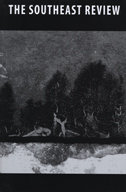 The Southeast Review‘s current issue (Volume 31, Number 1) features the winners of the 2012 contests:
The Southeast Review‘s current issue (Volume 31, Number 1) features the winners of the 2012 contests:
World’s Best Short-Short Story Contest
judged by Robert Olen Butler
Winner:
Hal Ackerman, “Belle and Melinda”
Finalists:
Heidi Bell, “Haunted”
Stace Budzko, “Why We Will Always Love You, Vera Knightville”
Michelle Dove, “Intruders”
Sandra Jensen, “Fault Lines”
Kat Gonso, “Capture the Flag”
Rochelle Hurt, “Impossible Child”
Sam Paradise, “At The Liberty Motor Inn Motel”
Chris Tusa, “Mean Blood” and “Neighborhood Association”
SER Poetry Contest
judged by James Kimbrell
Winner:
Noel Crook, “Crows”
Finalists:
Johleen Adena, “I Will Stop Loving You When This War Ends”
Barrett Warner, “Ammo Domini”
John Lander, “A Place to Hide My Crumbs”
Emily Pulfer-Terino , “What Will Never Be” and “The Familiar”
Benjamin Goldberg, “Busted Mirror of Everything Under the Sun”
Les Gottesman, “My Twentieth Century” and “Tremble”
Mark Wagenaar, “A Gospel of Hands & Breath”
SER Narrative Nonfiction Contest
judged by Jennine Capó Crucet
Winner:
Ruth Moose, “A Key As Big As My Hand”
Finalists:
JLSchneider, “The Glass Wall”
Kelly Sundberg, “Snow. Angel. Ghost
Spread the word!
Doppelganger Moment
`The Antioch Review’s most recent issue, “Our Doppelganger Moment,” starts what the editors have called their “doppelganger phase.” The magazine now has an electronic version available through JSTOR. Unlike some magazines that print two different versions, these will be the same, just available in two different formats. “We are now ‘double walkers,'” says Editor Robert S. Fogarty. “It will be the same magazine in both forms . . . The digital hadow version will not be a minor-league publication with also-ran authors appearing (those who could not make the cut for the hard-copy print edition). They will be separate and equal.”
This issue features Bruce Fleming, Jeffrey Meyers, Anis Shivani, Matthew Clark, Marcia Cavell, Thomas J. Cottle, Rick DeMarinis, Paul Christensen, Robert Ready, Alex M. Frankel, Sebastian Agudelo, Valerie Wohlfeld, Richie Hofmann, Richard Howard, and Alison Powell.
Spread the word!
For Your Monday: Shit Rough Drafts
Take a tumblr through Shit Rough Drafts. Definitely one to follow.
Spread the word!
Teacher Resource: About Science Fiction
AboutSF, founded in 2005, is the educational outreach arm of the Center for the Study of Science Fiction and is a joint-project of the Science Fiction and Fantasy Writers of America and the Science Fiction Research Association. Their mission is to encourage librarians, educators, and individuals to promote, teach, read and share Science Fiction, the literature of speculation and change.
The “For Teachers” content of the site includes: “Why teach SF?”; numerous full course outlines as well as shorter lesson plans; information on finding guest speakers; video of lectures and interviews; reading guides for a number of science fiction and fantasy novels; sample projects; “SF and _____” (current content includes -for the Science Classroom, -for the French Students, -for Math Students, -for Physics Students); and SF Poetry selected by author and poet Scott Green.
AboutSF welcomes correspondence from readers, teachers, and writers, including contributions to “Teaching the Future,” a column in which teachers share stories and advice about using SF in the classroom.
Spread the word!
Jane Austen Stamps
Jane Austen stamps were issued by the Royal Mail February 21. All six published novels are included to mark the 200th anniversary of Pride and Prejudice.
Spread the word!
First Nation Films
Since 1998, First Nation Films has been creating and distributing award-winning television documentary films for, by and about Indigenous people. Their exclusive programs are distributed to broadcasters, schools, libraries, universities and other individuals and institutions throughout the world. First Nation Films is also considers films for distribution.
Currently in production:
SO FAR FROM HOME
Two First Nations homeless youth search for the meaning of their home.
THE CIRCLES OF LIFE – The Medicine Wheel 2
Personal insight into the ancient stone circles in Canada and beyond!
TOTEM POLES
A visually beautiful film on the depth and meaning of the totem poles of the west coast – then and now.
BOUNDARIES
Analyzing the Indian “business” in Canada
First Nations Programs Available:
Life on the Reserve (real life)
Deception of Freedom (law)
The Medicine Wheel (native spirituality)
Whose Land is This? (land settlement)
Making Treaties (land settlement)
Role Models (inspiration for our youth)
Beat of the Drum (native music)
Native Women: Politics (history)
Reclaiming Our Children (child wellness)
DANCE – In Search of Hamat’sa (dance)
The Residential Schools (the other side)
Living in Two Worlds (old and new)
Dancing on the Moon (discovery)
Sleep Dancer (a dramatic journey)
Vanishing Links (returning to her roots)
HIV – If There’s a Will … (native people)
Echoes of the Sisters (breast cancer)
The Storytellers (truth and honor)
The Pipe Makers (making the pipe)
Sacred Buffalo People (culture and tradition)
The Medicine People (ceremony)
Spread the word!
Modern Haiku Awards
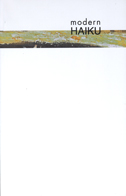 The favorite poems from the autumn 2012 issue are selected by an anonymous selector and donor, and the poets receive a $50 award.
The favorite poems from the autumn 2012 issue are selected by an anonymous selector and donor, and the poets receive a $50 award.
Favorite haiku:: Jayne Miller
dead of winter
making stock
from the bones
Favorite senryu: Dorothy McLaughlin
my ex’s date
wearing the dress
I almost bought
Favorite haibun: Harriot West
“A Brief Analysis of Contemporary Society as Seen Through My Eyes”
Spread the word!
Tiny Lights No Longer in Print
Tiny Lights announces with its latest issue (18.1) that it will be its last print issue.”The world has changed a lot since 1995, and while advances such as email and the Internet have made publishing easier, increased printing and mailing costs have taken this enterprise from impractical to impossible. What hasn’t changed is the loving support from our family of writers and readers, who continue to keep the power of story alive,” writes the editors. “The decision to end the hard copy version of Tiny Lights has not been smooth or easy . . . I hope you’ll stay tuned!” Current subscribers may choose to receive back issues or have their money refunded.
The final print issue features writing by Eleanor Stanford, Kathryn Wilder, Richard Jay Goldstein, Traci Moore, JLSchneider, Gillian P. Herbert, Margaret Rose, Barbara Shine, Marilyn Petty, Catherine Crawford, Jamie Moore, Laurel Aiona, Carol Hoorn, and Teresa Oefinger.
Spread the word!
December Fiction Open Winners
Glimmer Train has just chosen the winning stories for their December Fiction Open competition. This competition is held quarterly. Stories generally range from 2000-6000 words, though up to 20,000 is fine. The next Fiction Open will take place in March. Glimmer Train’s monthly submission calendar may be viewed here.
First place: Vi Khi Nao [Pictured], Providence, RI, wins $2500 for “Herman and Margaret.” Her story will be published in the Spring/Summer 2014 issue of Glimmer Train Stories.
Second place: David H. Lynn, of Gambier, OH, wins $1000 for “Divergence.” His story will be published in an upcoming issue.
Third place: Madhuri Vijay, of Bangalore, India, wins $600 for “Hill Station.”
A PDF of the Top 25 winners can be found here.
Deadline soon approaching! Short Story Award for New Writers: February 28. This competition is held quarterly and is open to all writers whose fiction has not appeared in a print publication with a circulation over 5000. No theme restrictions. Most submissions to this category run 1500-5000 words, but can go up to 12,000. First place prize is $1500. Second/third: $500/$300. Click here for complete guidelines.
Spread the word!
Carve in Print
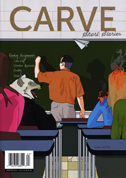 Carve has published their second print edition, this one themed about school. “It’s difficult to capture the range of joys and challenges one may experience in school in just one short story,” writes Editor-in-Chief Matthew Limpede. “We hadn’t planned to do a school-themed issue, but as we looked through the sotires that were drawing us in and receiving cheers from our reading committee, we realized we didn’t have just one story to give us insight into school, teenagers, and classrooms. We had four. Each of them present a different angle from which to view the prism.”
Carve has published their second print edition, this one themed about school. “It’s difficult to capture the range of joys and challenges one may experience in school in just one short story,” writes Editor-in-Chief Matthew Limpede. “We hadn’t planned to do a school-themed issue, but as we looked through the sotires that were drawing us in and receiving cheers from our reading committee, we realized we didn’t have just one story to give us insight into school, teenagers, and classrooms. We had four. Each of them present a different angle from which to view the prism.”
These stories that are included (along with interviews with the authors about writing style and processes) are “Lone Wolf” by Eric Freeze, “Literature Appreciation” by Man Martin, “Firebug” by Katie Cortese, and “Snow Day” by Gary V. Powell. Also in this issue is a Reject! section, which lists pieces rejected from Carve that have gone on to be published elsewhere; it also has a note both from Amber Krieger and the editor about the rejection of her piece “Among the Missing and the Dead” which went on to win the 2009 Fulton Prize and be published in the Adirondack Review.
Spread the word!
Short Grain Contest
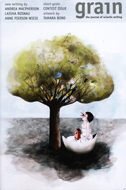 Grain hosted its 24th Annual Short Grain contest, judged by Lawrence Hill in fiction and rob mclennan in poetry. The Winter 2013 issue includes the winners along with comments from the judges. The winning fiction piece, Susan Mersereau’s “The Valley,” was selected because, according to Hill, it “leapt off the page from the first sentences, thanks to its strange, haunting, and unusual delivery.” And mclennan writes that in first place “something like being (five flights, for rafi),” speech is made out of single words, and less than. It can be that simple, that complicated.
Grain hosted its 24th Annual Short Grain contest, judged by Lawrence Hill in fiction and rob mclennan in poetry. The Winter 2013 issue includes the winners along with comments from the judges. The winning fiction piece, Susan Mersereau’s “The Valley,” was selected because, according to Hill, it “leapt off the page from the first sentences, thanks to its strange, haunting, and unusual delivery.” And mclennan writes that in first place “something like being (five flights, for rafi),” speech is made out of single words, and less than. It can be that simple, that complicated.
Fiction: judged by Lawrence Hill
1st Prize, $1000 — Susan Mersereau of Vancouver, BC
2nd Prize, $750 — Madeline Sonik of Victoria, BC
3rd Prize, $500 — Alexandra Sadinoff of New York, NY
Poetry: judged by rob mclennan
1st Prize, $1000 — Sean Howard of Main-à-Dieu, NS
2nd Prize, $750 — Jordan Abel of Vancouver, BC
3rd Prize, $500 — Kate Flaherty of Toronto, ON
Spread the word!
Poetry :: Portraits by Mark Irwin
American Life in Poetry: Column 413
BY TED KOOSER, U.S. POET LAUREATE
Every day, hundreds of thousands of us are preoccupied with keeping up a civil if not loving relationship with our parents. In this poem, Mark Irwin (who lives in Colorado) does a beautiful job in portraying, in a dreamlike manner, the complexities of just one of those relationships.
Portraits
Mother came to visit today. We
hadn’t seen each other in years. Why didn’t
you call? I asked. Your windows are filthy, she said. I know,
I know. It’s from the dust and rain. She stood outside.
I stood in, and we cleaned each one that way, staring into each other’s eyes,
rubbing the white towel over our faces, rubbing
away hours, years. This is what it was like
when you were inside me, she said. What? I asked,
though I understood. Afterwards, indoors, she smelled like snow
melting. Holding hands we stood by the picture window,
gazing into the December sun, watching the pines in flame.
American Life in Poetry is made possible by The Poetry Foundation (www.poetryfoundation.org), publisher of Poetry magazine. It is also supported by the Department of English at the University of Nebraska-Lincoln. Poem copyright ©2010 by Mark Irwin, whose most recent book of poems is Tall If, New Issues Poetry & Prose, 2008. Poem reprinted from The Sun, July, 2010, by permission of Mark Irwin and the publisher. Introduction copyright © 2013 by The Poetry Foundation. The introduction’s author, Ted Kooser, served as United States Poet Laureate Consultant in Poetry to the Library of Congress from 2004-2006. We do not accept unsolicited manuscripts.
******************************
American Life in Poetry provides newspapers and online publications with a free weekly column featuring contemporary American poems. The sole mission of this project is to promote poetry: American Life in Poetry seeks to create a vigorous presence for poetry in our culture. There are no costs for reprinting the columns; we do require that you register your publication here and that the text of the column be reproduced without alteration.
Spread the word!
2012 Lush Triumphant Winners
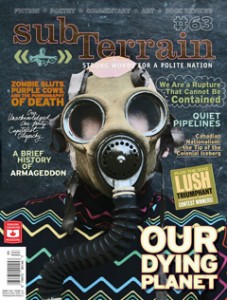 subTerrain‘s newest issue features the winners of the 2012 Lush Triumphant Literary Award Winners, the 10th annual contest.
subTerrain‘s newest issue features the winners of the 2012 Lush Triumphant Literary Award Winners, the 10th annual contest.
Winners
Fiction: Carleigh Baker’s “Last Call”
Poetry: Susan Musgrave’s “The Goodness of This World”
Runners-Up
Fiction: M.E. Powell’s “Grid Lines”
Poetry: Ashley-Elizabeth Best’s “Erratics”
Honorable Mention
Creative Nonfiction: Natalia Buchok’s “1948”
The rest of the issue features “Zombie Sluts, Purple Cows, and the Pornography of Death,” “We Are a Rupture That Cannot Be Contained,” “Canadian Nationalism: The Tip of the Colonial Iceberg,” and more.
Spread the word!
Puppets, Poetry, Japan, and Jesse Glass
 SPECS { } literary magazine from Rollins College features an interview with Jesse Glass as well as some of his work. Jesse Glass teaches literature and history at Meikai (Bright Sea) University in Japan, is author of The Passion of Phineas Gage and Slected Poems, publisher of Ahadada Press, and is a puppeteer and visual artist. His interview with SPECS covers his living abroad (“outsourcing” is SPECS theme), crossing boundaries of artistic expressions, and his work with the Meikai International Puppet Theater.
SPECS { } literary magazine from Rollins College features an interview with Jesse Glass as well as some of his work. Jesse Glass teaches literature and history at Meikai (Bright Sea) University in Japan, is author of The Passion of Phineas Gage and Slected Poems, publisher of Ahadada Press, and is a puppeteer and visual artist. His interview with SPECS covers his living abroad (“outsourcing” is SPECS theme), crossing boundaries of artistic expressions, and his work with the Meikai International Puppet Theater.
Spread the word!
Unsanctioned Writing and Freedom of Speech
Check out Sampsonia Way: A Magazine on Literary Freedom of Expression. The publication offers full, online content, with the latest column by Vijay Nair “The Mad Hatter’s Tea Party” in which Nair parallels Indian government to “Alice in Wonderland” — the country is falling down the rabbit hole with its paradoxic interpretation of free speech. Also featured are interviews with Frank Dullaghan, Hind Shoufani, Zeina Hashem Beck, and Jehan Bseiso in columns “Unsanctioned Writing from the Middle East“; and an account of an attack against journalist Lars Hedegaard, the Mexican cartel’s intimidation tactics, and a Chinese blogger’s grassroots revolution are covered in Freedom of Speech Roundup.
Spread the word!
Booth 2012 Poetry Prize
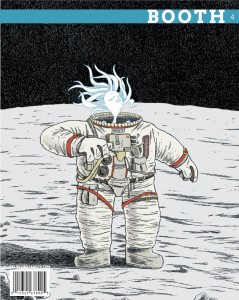 Booth 4 features the winners of the 2012 Poetry Prize, judged by Linda Gregg. Gregg’s awards include a Guggenheim Fellowship, the Whiting Writer’s Award, an NEA grant, a Lannan Literary Foundation Fellowship, the Lenore Marshall Poetry Prize, and multiple Pushcart Prizes. The first place winner received $500 and publication, and the second place winner won $250 and publication.
Booth 4 features the winners of the 2012 Poetry Prize, judged by Linda Gregg. Gregg’s awards include a Guggenheim Fellowship, the Whiting Writer’s Award, an NEA grant, a Lannan Literary Foundation Fellowship, the Lenore Marshall Poetry Prize, and multiple Pushcart Prizes. The first place winner received $500 and publication, and the second place winner won $250 and publication.
Winners
1st Prize: “How to Make a Beginning” by Aubrey Ryan
2nd Prize: “Bearing October” by Sarah Marcus
Honorable Mention: “Travelogue” by Claire Kiefer
Finalists
“Country Road” by George Amabile
“Distance and Order” by Dylan Carpenter
“Lion in the Limo” by Doug Paul Case
“To Know a Door” by Kate Rutledge Jaffe
“Travelogue” by Claire Kiefer
“May Support Life” by Alyse Knorr
“Bearing October” by Sarah Marcus
“How to Make a Beginning” by Aubrey Ryan
“Trout” by Emily Viggiano
“Flemish Giants” by Susan Yount

